The Future Does Not Have to Be Dystopic (Why I Wrote a Sci-Fi Comedy)
 We aspire; we imagine; we attempt (photo: Stephanie Barnhizer)
We aspire; we imagine; we attempt (photo: Stephanie Barnhizer) 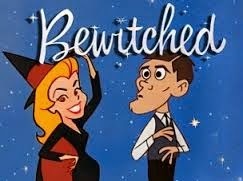 Just wriggle your noseMy journey to science fiction began like that of many people my age—as a child watching the original Star Trek episodes during the heady years of 1966 – 1969. During those years I also watched Batman, Betwitched, the Monkees, and Mr. Roger’s Neighborhood. All sorts of odd ideas about magic and heroism and technology and the world of imagination rattled around in my young mind. I didn’t understand until much later that I was seeing parody and cultural critique and a parable of the Cold War. I didn’t even know there was a Cold War, though I was vaguely aware of the hot one—Vietnam. I didn’t know there was a Civil Rights movement, although in 1968 I was aware people were upset when a King got killed. I just absorbed the pop culture presented to me, trying to make sense of the world as best I could. Though I taught myself to read at age four, it wasn’t until early 1969 that I tackled a real chapter book (Wizard of Oz!) and entered the kingdom of literature. Up until then television and my family were my prime sources of information.
Just wriggle your noseMy journey to science fiction began like that of many people my age—as a child watching the original Star Trek episodes during the heady years of 1966 – 1969. During those years I also watched Batman, Betwitched, the Monkees, and Mr. Roger’s Neighborhood. All sorts of odd ideas about magic and heroism and technology and the world of imagination rattled around in my young mind. I didn’t understand until much later that I was seeing parody and cultural critique and a parable of the Cold War. I didn’t even know there was a Cold War, though I was vaguely aware of the hot one—Vietnam. I didn’t know there was a Civil Rights movement, although in 1968 I was aware people were upset when a King got killed. I just absorbed the pop culture presented to me, trying to make sense of the world as best I could. Though I taught myself to read at age four, it wasn’t until early 1969 that I tackled a real chapter book (Wizard of Oz!) and entered the kingdom of literature. Up until then television and my family were my prime sources of information.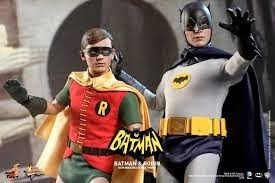 60's good guysI knew Bewitchedwas pretend but thought maybe I might run across magic someday just the same. (At this point I still believed in Santa Claus.) I knew that Batman was silly but it was lively and the goofy villains reassuringly never got the upper hand. I knew that The Monkees were real somehow (I had one of their records) but even at six I knew their show was far too nonsensical to have much relation to reality. I knew when Mr. Rogers’ trolley went into his King Friday puppet world it was pretend but also that the puppet world was much more interesting than the time he spent singing while taking on and off his real sweater.
60's good guysI knew Bewitchedwas pretend but thought maybe I might run across magic someday just the same. (At this point I still believed in Santa Claus.) I knew that Batman was silly but it was lively and the goofy villains reassuringly never got the upper hand. I knew that The Monkees were real somehow (I had one of their records) but even at six I knew their show was far too nonsensical to have much relation to reality. I knew when Mr. Rogers’ trolley went into his King Friday puppet world it was pretend but also that the puppet world was much more interesting than the time he spent singing while taking on and off his real sweater. 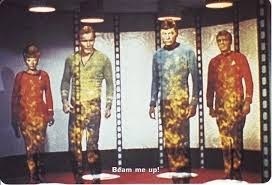 Magic?And then there was Star Trek, a show I watched with my parents. I knew it was pretend because many of the things they could do were akin to magic (“Beam me up, Scotty.”) But I also understood that Star Trek was more than pretend, because it was about the future, and even though it wasn’t true now, it might be true in the time to come. And so Star Trek created an odd idea category in my developing mind, one that danced back and forth across the imaginary/real boundary.
Magic?And then there was Star Trek, a show I watched with my parents. I knew it was pretend because many of the things they could do were akin to magic (“Beam me up, Scotty.”) But I also understood that Star Trek was more than pretend, because it was about the future, and even though it wasn’t true now, it might be true in the time to come. And so Star Trek created an odd idea category in my developing mind, one that danced back and forth across the imaginary/real boundary. 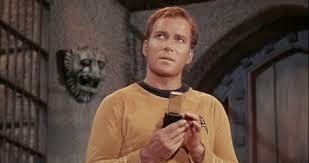 You have a better phone than Kirk.And some tech from Star Trek has already turned out to be real. Uhura’s earpiece receiver and computer tablet, flat screen TVs and video chats, flip-open phones/communicators, computer voice recognition and universal translators. Before a new technology can be created, first it must be imagined. And sometimes just the imagining ignites the desire to turn an idea into reality. Science fiction can be powerful stuff.
You have a better phone than Kirk.And some tech from Star Trek has already turned out to be real. Uhura’s earpiece receiver and computer tablet, flat screen TVs and video chats, flip-open phones/communicators, computer voice recognition and universal translators. Before a new technology can be created, first it must be imagined. And sometimes just the imagining ignites the desire to turn an idea into reality. Science fiction can be powerful stuff. Happy futureBut the best part of creating science fiction goes far beyond imagining cool gadgets and tech. Because of its strange dance across the line of possible future truth, science fiction is a powerful way to examine and critique the human experience. Often this is done through dystopic future-casting, some examples being 1984, Fahrenheit 451, Brave New World, Blade Runner, Childhood’s End, Ender's Game, The Handmaid’s Tale, the Firefly series (TV), the Hunger Games trilogy and The Children of Men. All show a frightening vision of possible trends in human culture. It’s not the advances in science that are so grim in these narratives, it’s what humans do with them. Most of these books/movies/TV shows have little in the way of humor, not surprising when the realities they depict are so bleak. (Yes, Firefly fans, that show has its humorous moments, but you have to admit the Reavers are some of the worst bit of nastiness ever created.) Beware, watch out! the generators of these dystopias say. Their cautionary tales are meant to disturb us, prod us into action to prevent our descent into these various self-created hells.
Happy futureBut the best part of creating science fiction goes far beyond imagining cool gadgets and tech. Because of its strange dance across the line of possible future truth, science fiction is a powerful way to examine and critique the human experience. Often this is done through dystopic future-casting, some examples being 1984, Fahrenheit 451, Brave New World, Blade Runner, Childhood’s End, Ender's Game, The Handmaid’s Tale, the Firefly series (TV), the Hunger Games trilogy and The Children of Men. All show a frightening vision of possible trends in human culture. It’s not the advances in science that are so grim in these narratives, it’s what humans do with them. Most of these books/movies/TV shows have little in the way of humor, not surprising when the realities they depict are so bleak. (Yes, Firefly fans, that show has its humorous moments, but you have to admit the Reavers are some of the worst bit of nastiness ever created.) Beware, watch out! the generators of these dystopias say. Their cautionary tales are meant to disturb us, prod us into action to prevent our descent into these various self-created hells. 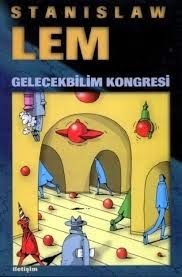 Of course there are exceptions to the humorlessness of sci-fi dystopia. A mordantly funny, wildly dystopic sci-fi book I admire is The Futurological Congress by Stanislaw Lem. (He also wrote Solaris, the film of which had no inkling of humor whatsoever, but since Lem himself said none of the film versions made an attempt to capture the essence of his novel, maybe someday I’ll be brave and try it out.)
Of course there are exceptions to the humorlessness of sci-fi dystopia. A mordantly funny, wildly dystopic sci-fi book I admire is The Futurological Congress by Stanislaw Lem. (He also wrote Solaris, the film of which had no inkling of humor whatsoever, but since Lem himself said none of the film versions made an attempt to capture the essence of his novel, maybe someday I’ll be brave and try it out.) The granddaddy of all modern science fiction, Isaac Asimov’s Foundation series had perhaps a dystopic cast to it, but it wasn’t essentially pessimistic. Yes, the grand human empire falls apart, but due to smart men (as far as I can remember it is almost entirely men who take action) the ensuing dark ages lasts only a thousand years instead of thirty thousand. As sci-fi dystopia goes, this is a unicorn and rainbows outcome.
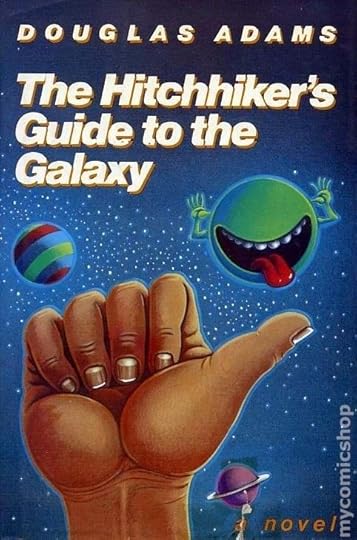 Hitchhiker’s Guide to the Galaxy is dystopian in its way (after all the Earth is destroyed by the Vorgons pretty much immediately) but Douglass Adams finds even wiping out humans a comical event, and both the universe and life go on in an entertaining fashion.
Hitchhiker’s Guide to the Galaxy is dystopian in its way (after all the Earth is destroyed by the Vorgons pretty much immediately) but Douglass Adams finds even wiping out humans a comical event, and both the universe and life go on in an entertaining fashion. My formative years, however, were filled not with sci-fi dystopias, but with cartoonish superheroes, happy witch families, pothead pop stars, and deep Star Trek optimism. The original Star Trek (and also most ensuing versions) was a combination adventure story and exploration of human morality. Anti-war and pro-racial diversity, the show promulgated that humans in the future could unite, live in peace, and explore the universe with mostly altruism and integrity. Gene Roddenberry, the creator, wanted to illuminate humanity’s potential if war and violence on Earth could be put behind it.
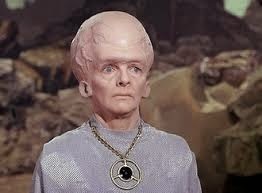 Cancelled? You've got to be kidding.After three seasons the show was cancelled for low ratings. The last episode ran six weeks before humans first walked on the moon. Over the years the initial series has received just criticism for not entirely escaping racism, imperialism and sexism, although, to be fair, it managed a great deal less of it than most shows of its day. During the 70s Star Trek was syndicated, shown as reruns, and gained a much larger audience than it had originally. It was seen by secondary TV stations as effective counter-programming against the Big Three stations 6 o'clock news. It developed a cult following, the first Trekkie convention was held in 1972, and the rest is history.
Cancelled? You've got to be kidding.After three seasons the show was cancelled for low ratings. The last episode ran six weeks before humans first walked on the moon. Over the years the initial series has received just criticism for not entirely escaping racism, imperialism and sexism, although, to be fair, it managed a great deal less of it than most shows of its day. During the 70s Star Trek was syndicated, shown as reruns, and gained a much larger audience than it had originally. It was seen by secondary TV stations as effective counter-programming against the Big Three stations 6 o'clock news. It developed a cult following, the first Trekkie convention was held in 1972, and the rest is history.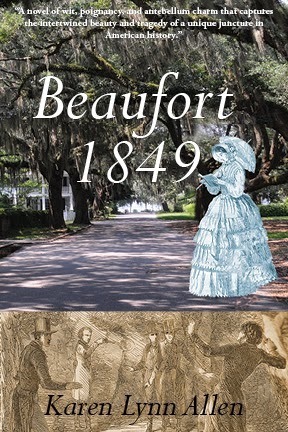 My last book,
Beaufort 1849
, was a cautionary tale, but one couched in historical rather than science fiction. It depicts a society, the antebellum South, that needed to change its slave-based economy and energy source to a wage-based economy fueled, ironically (in my view), by coal. (Water-powered mills would also have been an option.) This transition would’ve meant some loss of power and wealth by the Southern elite. Instead of changing, this elite doubled down on their way of life and lost everything. To me there are direct parallels to our own society (we need to transition to a sustainable economy fueled by sustainable power sources), but I suppose any resemblance is easy enough to ignore. Many believe that the antebellum South was evil and racist, we today are not evil and racist, and so we have nothing to learn from their choices, etc. Ah well. Personally I'm not sure that enslaving millions of people is any more evil than killing off billions through disease and famine, which is on deck to happen quite soon, but history will be the judge of that.
My last book,
Beaufort 1849
, was a cautionary tale, but one couched in historical rather than science fiction. It depicts a society, the antebellum South, that needed to change its slave-based economy and energy source to a wage-based economy fueled, ironically (in my view), by coal. (Water-powered mills would also have been an option.) This transition would’ve meant some loss of power and wealth by the Southern elite. Instead of changing, this elite doubled down on their way of life and lost everything. To me there are direct parallels to our own society (we need to transition to a sustainable economy fueled by sustainable power sources), but I suppose any resemblance is easy enough to ignore. Many believe that the antebellum South was evil and racist, we today are not evil and racist, and so we have nothing to learn from their choices, etc. Ah well. Personally I'm not sure that enslaving millions of people is any more evil than killing off billions through disease and famine, which is on deck to happen quite soon, but history will be the judge of that. With
Universal Time
, I was interested not in warning but, like Roddenberry, in imagining what is possible for the future of humanity. What could be achieved if a race of human-like sentient beings put war, over-population, and environmental devastation behind them, and then, over a million years of conscious evolution, created a society that joyously and harmoniously met the needs of all its members? Such beings would still have problems, of course, as the Tivoleans in my book do. (After all, without problems there are no stories.) But in the end they solve their problems on their own terms, according to their principles of non-violence.
With
Universal Time
, I was interested not in warning but, like Roddenberry, in imagining what is possible for the future of humanity. What could be achieved if a race of human-like sentient beings put war, over-population, and environmental devastation behind them, and then, over a million years of conscious evolution, created a society that joyously and harmoniously met the needs of all its members? Such beings would still have problems, of course, as the Tivoleans in my book do. (After all, without problems there are no stories.) But in the end they solve their problems on their own terms, according to their principles of non-violence.I wrote the book at a time when the topics pressing on my mind were health, education and the US invasion of Iraq. Now that we’ve seemingly become inured to endless war and I’m more panicked about energy issues and the environment, I probably would’ve written it differently today, but I’m still happy with the sense of optimism and expansive possibilities the novel presents, and its affectionate rather than mordant humor. After all, imagining that something can exist is the first step to making it possible.
Published on March 29, 2015 09:32
No comments have been added yet.



